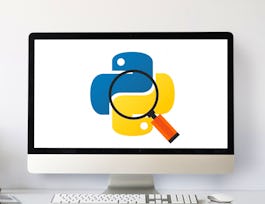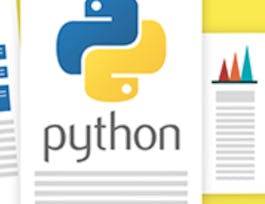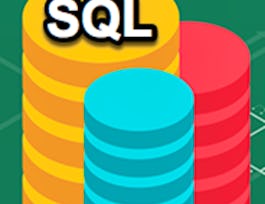Kickstart your learning of Python with this beginner-friendly self-paced course taught by an expert. Python is one of the most popular languages in the programming and data science world and demand for individuals who have the ability to apply Python has never been higher.


Python for Data Science, AI & Development
This course is part of multiple programs.
Taught in English
Some content may not be translated

Instructor: Joseph Santarcangelo
809,608 already enrolled
Included with 
Course
(35,390 reviews)
94%
Recommended experience
What you'll learn
Learn Python - the most popular programming language and for Data Science and Software Development.
Apply Python programming logic Variables, Data Structures, Branching, Loops, Functions, Objects & Classes.
Demonstrate proficiency in using Python libraries such as Pandas & Numpy, and developing code using Jupyter Notebooks.
Access and web scrape data using APIs and Python libraries like Beautiful Soup.
Skills you'll gain
Details to know

Add to your LinkedIn profile
22 assignments
Course
(35,390 reviews)
94%
Recommended experience
See how employees at top companies are mastering in-demand skills

Build your subject-matter expertise
- Learn new concepts from industry experts
- Gain a foundational understanding of a subject or tool
- Develop job-relevant skills with hands-on projects
- Earn a shareable career certificate


Earn a career certificate
Add this credential to your LinkedIn profile, resume, or CV
Share it on social media and in your performance review

There are 5 modules in this course
This module teaches the basics of Python and begins by exploring some of the different data types such as integers, real numbers, and strings. Continue with the module and learn how to use expressions in mathematical operations, store values in variables, and the many different ways to manipulate strings.
What's included
6 videos6 readings4 assignments4 app items3 plugins
This module begins a journey into Python data structures by explaining the use of lists and tuples and how they are able to store collections of data in a single variable. Next learn about dictionaries and how they function by storing data in pairs of keys and values, and end with Python sets to learn how this type of collection can appear in any order and will only contain unique elements.
What's included
3 videos1 reading4 assignments4 app items3 plugins
This module discusses Python fundamentals and begins with the concepts of conditions and branching. Continue through the module and learn how to implement loops to iterate over sequences, create functions to perform a specific task, perform exception handling to catch errors, and how classes are needed to create objects.
What's included
5 videos1 reading6 assignments6 app items7 plugins
This module explains the basics of working with data in Python and begins the path with learning how to read and write files. Continue the module and uncover the best Python libraries that will aid in data manipulation and mathematical operations.
What's included
6 videos1 reading4 assignments6 app items8 plugins
This module delves into the unique ways to collect data by the use of APIs and web scraping. It further explores data collection by explaining how to read and collect data when dealing with different file formats.
What's included
6 videos3 readings4 assignments6 app items5 plugins
Instructor

Offered by
Recommended if you're interested in Data Analysis
Why people choose Coursera for their career




Learner reviews
Showing 3 of 35390
35,390 reviews
- 5 stars
71.75%
- 4 stars
20.84%
- 3 stars
4.57%
- 2 stars
1.48%
- 1 star
1.33%
New to Data Analysis? Start here.

Open new doors with Coursera Plus
Unlimited access to 7,000+ world-class courses, hands-on projects, and job-ready certificate programs - all included in your subscription
Advance your career with an online degree
Earn a degree from world-class universities - 100% online
Join over 3,400 global companies that choose Coursera for Business
Upskill your employees to excel in the digital economy
Frequently asked questions
To earn an IBM Badge that recognizes your competence in Python for data science and AI, take this course as part of one of the following programs:
- IBM Applied AI Professional Certificate
- Applied Data Science Specialization
- IBM Data Science Professional Certificate
This course consists of four modules.
Module 1 - Python Basics
oYour first program
oTypes
oExpressions and Variables
oString Operations
Module 2 - Python Data Structures
oLists and Tuples
oSets
oDictionaries
Module 3 - Python Programming Fundamentals
oConditions and Branching
oLoops
oFunctions
oObjects and Classes
Module 4 - Working with Data in Python
oReading files with open
oWriting files with open
oLoading data with Pandas
oNumpy
Finally, you will create a project to test your skills.
Access to lectures and assignments depends on your type of enrollment. If you take a course in audit mode, you will be able to see most course materials for free. To access graded assignments and to earn a Certificate, you will need to purchase the Certificate experience, during or after your audit. If you don't see the audit option:
The course may not offer an audit option. You can try a Free Trial instead, or apply for Financial Aid.
The course may offer 'Full Course, No Certificate' instead. This option lets you see all course materials, submit required assessments, and get a final grade. This also means that you will not be able to purchase a Certificate experience.





